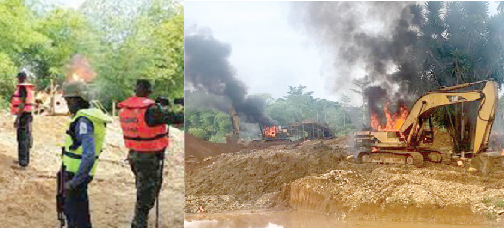
Western Region 2021: Kidnapping, mining, road construction major happenings
The year 2021 has been an eventful year for the Western Region.
The region witnessed a number of infrastructural development, cases of kidnapping, issues of illegal mining, community mining programmes and the christening of the regional capital, Sekondi-Takoradi, as the official Christmas City.
The region remained one of the resourceful areas in the country, especially with its contributions in terms of gold, manganese, bauxite, oil and gas exploration and production, cocoa, among others.
Resources
The region has a very important power enclave in Shama, gas processing plants and onshore reception centre as well as liquefied petroleum gas (LPG) facilities in the Ellembelle District.
It is also a beneficiary of some completed and ongoing one district, one factory projects.
However, one interesting development that over-shadowed the beauty and the resourcefulness of the region was the series of kidnapping cases recorded over the few years.
The year saw the trial of two Nigerians who were involved in the kidnapping and killing of four girls in Takoradi.
Two Nigerians
The Sekondi High Court, presided over by Justice Richard Adjei-Frimpong, a Justice of the Court of Appeal, with additional responsibility as a High Court Judge, sentenced the two Nigerians, Samuel Udoetuk-Wills and John Oji to death by hanging after a seven-member jury found them guilty on eight counts of murder.
The judgment brought a closure to the case of the four missing Takoradi girls — Ruth Abekah, 18; Priscilla Blessing Bentum, 21; Ruth Love Quayson, 18 and Priscilla Mantebea Koranchie, 15.
The girls went missing between July and December 2018 in the Sekondi-Takoradi metropolis.
The case became known as the ‘Takoradi missing girls’, with numerous campaigns organised across the country to put pressure on authorities to find them.
There were other cases of fake kidnapping with some on trial, while others had been determined and suspects sentenced.
Galamsey
In the extractive sector, the issue of illegal mining (galamsey) became a major issue as illegal miners descended heavily on water bodies; forest reserves with their activities, threatening national installations and access to potable water.
As the illegal mining activities assumed an alarming proportion in the Western and other mining regions, President Nana Addo Dankwa Akufo-Addo reaffirmed his determination to root out illegal mining.
He declared support for the fight against galamsey and stated that the burning of equipment used for the pollution of water bodies and forest reserves would not cease till the criminal acts were halted.
The crackdown, red zone
The operation halt in the region started with a recce, led by the Minister of Lands and Natural Resources, Mr. Samuel Abu Jinapor, with support from other sector ministries – environment, water resources and regional levels.
The recce exposed the imminent threat to water supply, loss of forest cover and environment in general, which triggered the deployment of the military, leading to the burning of many mining equipment and the declaration of red zones.
The clampdown led to the displacement of many illegal miners, hence the introduction of the National Alternative Employment and Livelihood Programme (NAELP) launched by the President with the expectation to provide employment for more than 220,000 illegal miners.
Community mining
The programme is targeted at people affected by the crackdown on illegal mining (galamsey).
They would be allocated space and provided with technical assistance by geologists, mining engineers and other experts to ensure that they carried out mining activities in a responsible manner to protect lives and the environment.
President Akufo-Addo, who launched the programme in Tarkwa, said he had instructed the Minister of Finance to make adequate budgetary allocation in the 2022 Budget and Fiscal Policy of the government to fund the programme.
The programme was in line with the government’s vision of ameliorating the unintended and unavoidable hardships following the clampdown by Operation Halt.
Roads
The President in October 2021, cut the sod for the reconstruction of the much- awaited Tarkwa-Agona-Nkwanta road that remained one of the most exciting news for the people in the region that would offer a major boost for doing business in the area.
The stretch currently is in a very bad shape ridden with countless potholes.
The last rainy season worsened the situation, making it tortuous to travel on. Work is expected to be completed on time and on schedule.
The road that linked the Western Region to the Central and the Western North regions as well as the Port of Takoradi, is being constructed at the cost of €95-million and when completed will reduce travel time, improve healthcare delivery and ambiance for businesses across the region.
Other projects
Other infrastructure projects that are ongoing in the region include the reconstruction of the Takoradi Central Market, the three-tier interchange and the construction of the operational headquarters of the national oil company – Ghana National Petroleum Corporation (GNPC).
After the sod cutting in 2020, the actual construction work on the first interchange in the Western Region began at PTC/Kwame Nkrumah Roundabout in Takoradi.
The project, which would take 30 months to be completed, is progressing steadily.
The interchange is expected to improve traffic flow in the Sekondi-Takoradi metropolis and provide a seamless connection to towns, cities and other parts of the Western Region.
